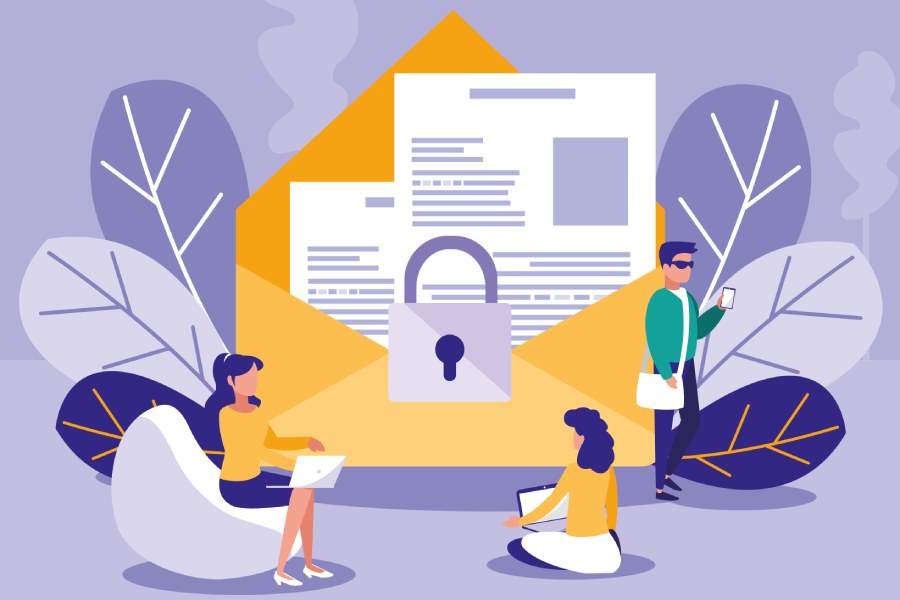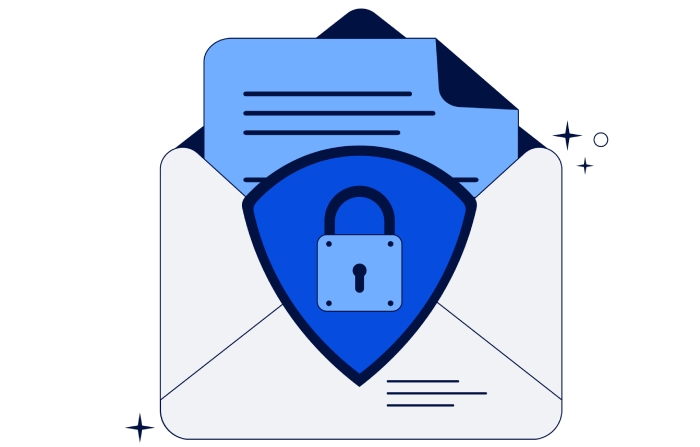Walking in the shoes of a Chief Information Officer (CIO) brings the colossal responsibility of securing the clients’ interests. With online adversaries escalating in the digital age, email security continues to be a priority for organizations. Given that 88% of global organizations encountered spear-phishing attempts in 2019, the adversaries look even more menacing a couple of years later. For a CIO, the Information Technology policies largely revolve around managing persistent threats coming through emails. In 2021, emails continue to be one of the favorite channels for malicious actors to inflict damage. Therefore, right from choosing the email hosting provider to incorporating the security protocols, one needs to be on the front foot.
Statistics Show Why Email Security Is As Important As Ever
The follow statistics indicate towards the importance of adopting robust email security measures for an organization in today’s times:
- A study reveals that 74% of enterprises believe cyberattacks harm their ventures. 78% of the respondents believe that the cost of data breaches through emails keeps mounting.
- While spear phishing continues to be a persistent email threat, 43% of victims reported malware infliction. Another 33% complained of stolen credentials, while 20% of the respondents reported financial loss.
- While only 68% of the organizations implemented email authentication measures, only 29% deployed sandboxing technologies.
- Emails deliver as much as 94% of the malware to the systems.
- Among malicious email attachments 48% happen to be office files.
Naturally, forward-thinking CIOs habitually partner with trusted email service providers to ensure email security. Through the process, they can shield their organizations and clients against possible adversaries, including malware, phishing attempts, and ransomware attacks.
What Vulnerabilities Do CIOs Need To Manage When They Handle Emails?
Email security involves several collective measures that guarantee the security of content exchanged across emails. Given that emails happen to be the most impactful means for corporate and personal communication, CIOs need to ramp up email security. Partnering with one of the leading email hosting service providers is highly beneficial as it ensures a comprehensive suite of defense mechanisms. Most reputed hosting providers offer email migration services apart from other services like email continuity assurance and tenant migration. By joining hands with an efficient email security provider, a CIO can effectively handle the following challenges while dealing with emails.
Email Deliverability Issue
Ensuring the arrival of the emails in the inbox is an integral part of email security. Malicious actors can mess with email deliverability, wreaking havoc on the enterprise’s reputation and success. Spoofed emails imitating an organization’s identity affect message deliverability severely. An enterprise must apply appropriate metrics to study email deliverability levels. Also, robust email authentication standards are essential to check spoofing attempts.
Phishing Attempts
As much as 91% of malicious actors deploy phishing emails as a means to disrupt organizational data integrity at the outset. Given that employees and users continue to fall prey to social engineering techniques, CIOs need to stand against such threats. Deploying spam filters can ward off malicious emails, including the ones carrying phishing attachments and links. Selecting the right email hosting platform and other preventive strategies can secure the system against threats such as social engineering.
Ransomware Delivery
As ransomware attacks continue to be a threat to any organization, fortifying emails to keep such threats at bay becomes necessary. Considering that most of the malware gets injected through emails, securing these gateways can ward off possible attacks. With a secure email gateway in place, CIOs would benefit from attachment sandboxing and URL defense technologies. Eventually, these adversaries would be unable to reach the end-users or employees.
Securing And Managing Email For Your Clients
As the world delves further into digitization, the organizational weight of emails keeps mounting. Each day, emails appear to be a more concentrated and significant target for malicious actors. Under such trying circumstances, CIOs need to be strategic with their policies for securing and managing emails for their clients.
Email security primarily encompasses bypassing malicious emails to ward off online adversaries. Here are some of the crucial email security strategies that security managers must deploy today.
Incorporating DMARC Protocols
Firstly, CIOs should recognize and incorporate the DMARC protocols to ensure email authentication. It can secure their respective organizations from email spoofing. Eventually, they would succeed in shielding the enterprise email from being used fraudulently by malicious actors. This measure can ensure the clients don’t experience email domain hijacks. Incorporating DMARC protocols would prevent the emails from landing in the spam folders of the recipients. Resultantly, it enables an organization to bolster its brand image.
Encrypting Emails
Email encryption has proven to be one of the most effective strategies to maintain the privacy of emails. The leading email service providers offer advanced encryption capabilities. It would secure emails from the prying eyes of malicious actors. Effectively deployed, the mechanism jumbles the messages, rendering it virtually impossible for intruders to decipher the same. With a reliable client-side encryption service, the message text would remain unreadable, even if the intruders get across to the inbox.
Robust Spam Filter
Most successful organizations are moving towards cloud-based email services. A significant reason is that they offer effective spam filters to ward off malicious emails. It is highly recommended to collaborate with a service provider offering robust spam filters. CIOs can prevent employees and other users from accidentally opening emails containing malicious links by deploying this mechanism. Coordinating with a reputed email hosting provider will make organizing and sorting emails a breeze.
Benefits Of Partnering With Email Service Providers
Considering better email security and management, it is always logical to partner with one of the leading email service providers. A CIO should realize the value of professional service, ensuring the security and deliverability of emails.
As most established providers offer tenant migration services, it won’t be an issue to embrace the new platform. With a robust line of defense in place, including spam filters and email authentication protocols, one can bolster the organization’s marketing campaigns as well.
Most of the service providers incorporate powerful features to automate the systems. With other features like tracking and reporting, they can deliver value to an organization. Additional inclusions like customized templates and personalization come as a bonus.
Final Words
As emails constitute the core channel of corporate communication, securing the system happens to be a priority for CIOs. Seeking a viable solution to combat online threats, most global brands collaborate with reputed service providers. Besides choosing the right email hosting provider, CIOs must also ensure that the proper defense mechanisms, such as the DMARC protocols, authenticate emails.


